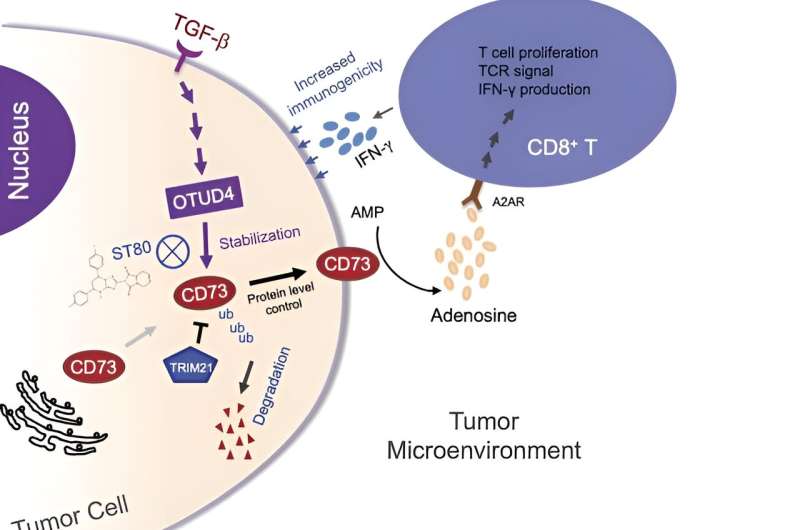This article has been reviewed according to Science X's editorial process and policies. Editors have highlighted the following attributes while ensuring the content's credibility:
fact-checked
peer-reviewed publication
trusted source
proofread
Targeting protein interactions may boost antitumor immunity in breast cancer

A multi-institutional team of investigators has discovered that targeting a specific protein interaction within immunosuppressive breast cancer cells may increase antitumor immune responses in otherwise difficult to treat solid tumors, according to recent findings published in the Journal of Clinical Investigation.
"Our findings uncover a novel strategy for targeting immunosuppressive OTUD4-CD73 proteolytic axis in treating immune-suppressive breast cancers with the inhibitor ST80," said Bin Zhang, MD, Ph.D., the Johanna Dobe Professor of Cancer Immunology and a co-corresponding author of the study.
"Immune-cold" tumors are those that lack effector immune cells in the tumor tissue, and can therefore suppress the body's immune system from targeting and attacking the tumor cells. Most cancers, including different types of advanced breast cancer, ovarian cancer, prostate cancer, pancreatic cancer and glioblastoma, are considered immune-cold tumors.
These tumors are also generally unresponsive to immunotherapy, underscoring the need for more aggressive and effective targeted therapies.
In the current study, Zhang and collaborators used multi-omics and other experimental validation techniques to study intracellular mechanisms in triple-negative breast cancer (TNBC) cells, which are notoriously immunosuppressive and extremely resistant to current immunotherapies.
They found that the OTUD4 protein counteracting ubiquitylation—a process by which a ubiquitin protein is attached to a substrate protein—from the TRIM21 protein, and as a result, regulating the de-ubiquitylation of the CD73 protein.
"Nobody knew how deubiquitinating enzymes regulate CD73 in these tumor cell compartments and mediate immune regulation," said Zhang, who is also a professor of Medicine in the Division of Hematology and Oncology, of Microbiology-Immunology and of Pathology.
The finding supports previous work from Zhang and other Feinberg investigators, which found that targeting increased CD73 expression in TNBC tumor cells may promote anti-tumor immunity and slow cancer progression.
Therefore, targeting this OTUD4-CD73 protein interaction, or proteolytic axis, may show promise in supporting antitumor immunity in TNBC, according to Zhang.
"This balancing of both arms, of OTUD4 and TRIM21, can precisely regulate CD73 at the protein level and eventually hinder tumor immunity," Zhang said.
Next, the scientists aimed to understand how the OTUD4-CD73 proteolytic axis plays a role in immune reactions within the tumor microenvironment. Using spatial transcriptome profiling to analyze TNBC cells from both mouse models and human patients, the team discovered that the TGF (transforming growth factor)-beta signaling pathway, which promotes many cellular processes including cell growth, differentiation and migration, controls the OTUD4-CD73 proteolytic axis within the TNBC cells.
Additionally, the scientists used a newly developed inhibitor, called ST80, to disrupt the proteolytic interaction between CD73 and OTUD4, which ultimately destabilized CD73 and reinvigorated antitumor immune properties in cytotoxic CD8+ T-cells.
Targeting the immunosuppressive OTUD4-CD73 proteolytic axis may be an effective precision medicine strategy for TNBC and other immune-cold tumors, and the approach also challenges current treatment strategies which use small molecule inhibitors to target CD73 activity, according to Zhang.
"Targeting the proteins themselves, in my opinion, could be much more effective in terms of anti-tumor efficacy," Zhang said.
More information: Yueming Zhu et al, Pharmacological suppression of the OTUD4-CD73 proteolytic axis revives antitumor immunity against immune-suppressive breast cancers, Journal of Clinical Investigation (2024). DOI: 10.1172/JCI176390

















